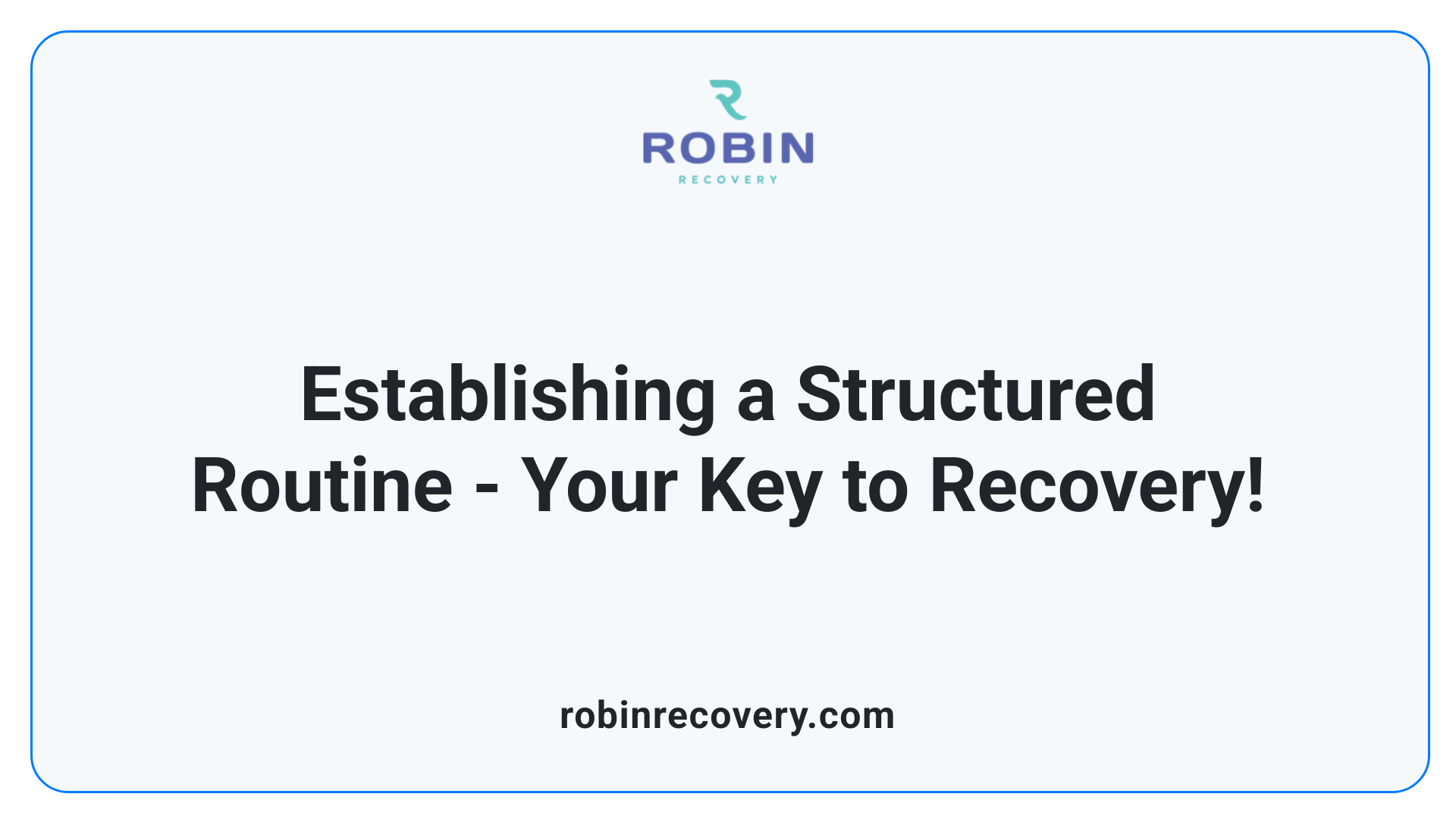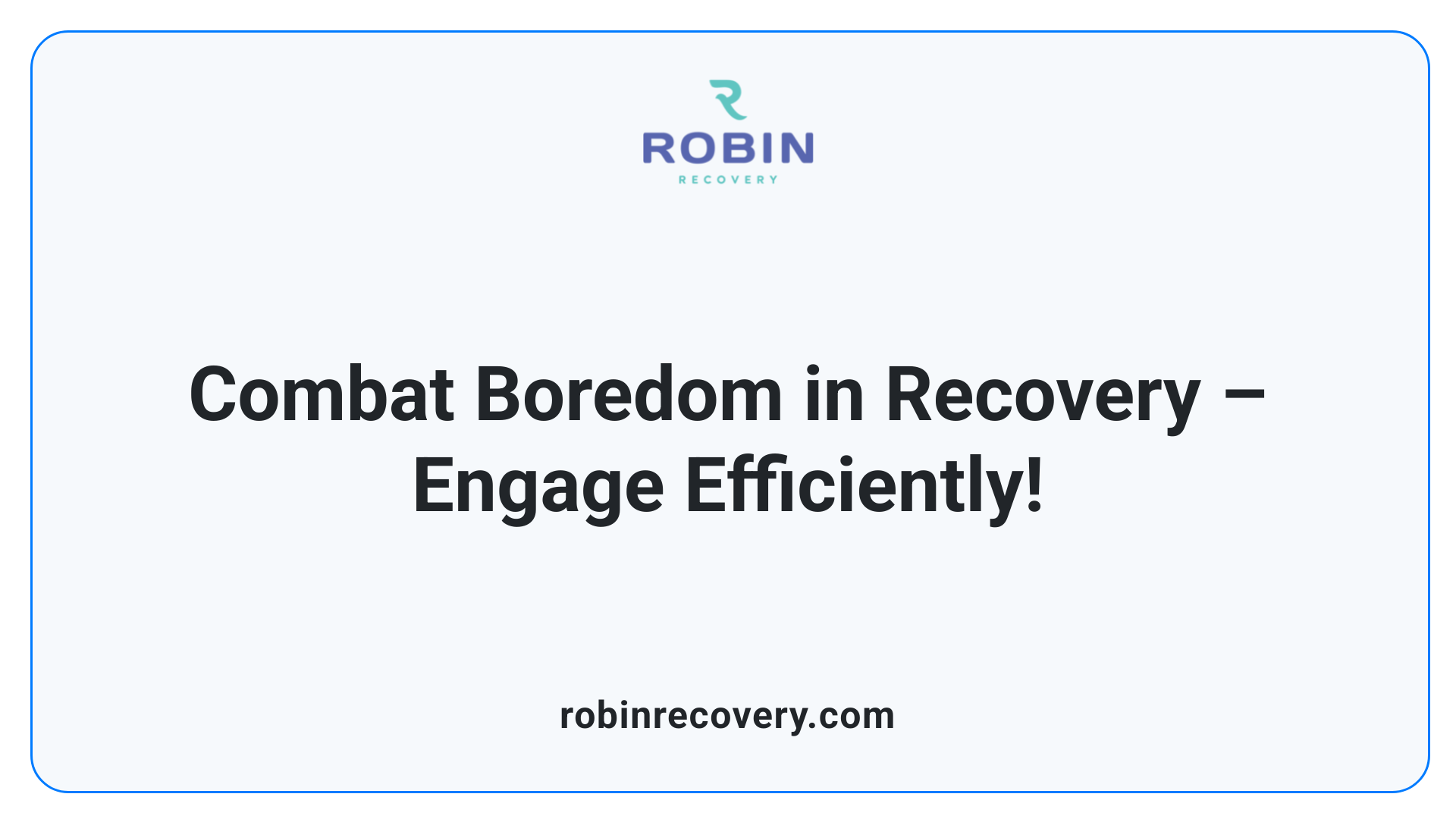How to make the most of your time during recovery

Understanding the Importance of Time Management During Recovery
Recovery from addiction is a transformative journey that requires careful attention to how one spends their time. Establishing a reliable daily routine, engaging in meaningful activities, and addressing emotional challenges can significantly impact the recovery process. This article explores several strategies to help you make the most of your time during recovery, ensuring a strong foundation for both personal growth and sustained sobriety.
Establishing a Routine for Successful Recovery

Why is routine important in recovery?
Routine is essential in recovery as it replaces unhealthy habits with new, constructive practices, providing a stabilizing force during vulnerable times. It helps individuals maintain self-control, mitigating the risk of relapse by keeping them engaged in structured, meaningful activities.
A consistent schedule fosters feelings of security and accountability, enhancing self-esteem and mental health. Additionally, having a predictable routine aids in managing stress, improves physical well-being through better sleep and nutrition, and combats boredom that can trigger cravings.
Maintaining stability and security
Establishing a structured routine is crucial in recovery. Here are some aspects that outline its significance:
- Supportive Environment: Creating a safe and organized living space promotes positive energy flow, encouraging healthier choices.
- Balanced Activities: A routine that includes various activities such as exercise, hobbies, and support meetings helps maintain engagement and fulfillment.
- Emotional Health: Regular participation in community activities fosters connections, reducing feelings of isolation.
Element Benefits Example Activities Schedule Promotes accountability Set daily tasks and time for hobbies Nutrition Improves mood and clarity Meal planning and cooking healthy meals Sleep Restores energy and focus Establishing a consistent bedtime routine Relaxation Lowers stress and aids mental health Mindfulness practices and journaling Support Networks Provides motivation and connection Attend support group meetings regularly
Ultimately, building a healthy routine is crucial for establishing stability and comfort, empowering individuals in their journey toward recovery.
Strategies to Cope with Boredom

How can I cope with boredom during recovery?
Coping with boredom during recovery is essential, as it can be a trigger for relapse. Finding ways to actively engage your mind and body can help keep you on track. Here are some strategies to manage boredom effectively:
- Create a Structured Routine: Setting a consistent daily schedule is vital. Include time slots for meals, exercise, work, and leisure activities. This balance helps fill unplanned time and reduces the risk of returning to unhealthy habits.
- Engage in New Hobbies: Discover new interests or rekindle old ones. Engaging in creative activities such as arts and crafts, music, or writing can provide a productive outlet for emotions and fill your time meaningfully.
- Physical Activity: Exercise boosts dopamine and can elevate mood. Incorporate activities like hiking, yoga, or joining dance classes to make physical health fun and engaging.
- Volunteer Opportunities: Helping others not only fills your time but also reinforces your sense of purpose. Community service, helping at local shelters, or participating in group events can connect you with like-minded individuals.
- Utilize Therapeutic Tools: Tools like the "Boredom During Recovery CBT Worksheet" can help you identify triggers for boredom and develop healthier coping strategies. Discussing your feelings with trusted friends or peers can also provide support and new ideas for activities.
Building New, Positive Habits

How can I build new habits during recovery?
Creating new, positive habits during recovery is essential for maintaining long-term sobriety and enhancing overall well-being. Start by implementing small, manageable changes that can easily fit into your daily routine. This could include activities like regular exercise, preparing healthy meals, or establishing a consistent sleep schedule.
To increase the likelihood of consistency, link new habits to existing routines. For instance, if you plan to start exercising, try pairing it with your morning coffee time. Gradually integrating changes makes them feel less daunting.
Celebrating even minor achievements can significantly boost your motivation to continue. Acknowledging each small victory cultivates a positive mindset and reinforces your commitment to recovery.
Utilizing tools, such as habit plan worksheets, can also help to structure your efforts and hold you accountable. Consider setting specific, measurable goals that allow you to track your progress effectively. Regular reflection and adjustment of your plan will support you in making lasting changes and in your journey toward a healthier lifestyle.
Methods for forming new habits
A diverse range of methods can be employed to solidify new habits in recovery:
- Consistency: Establishing routines can instill discipline, putting you on a path to success.
- Visualization: Picture your goals and the benefits of achieving them.
- Peer Support: Encourage accountability by sharing your goals with peers or within a support group.
- Positive Reinforcement: Reward yourself for sticking to new habits, reinforcing your commitment.
Reinforcing healthy behaviors
Reinforcing healthy behaviors involves continuous effort:
- Journaling: Document your journey to track emotions and milestones.
- Rewards System: Incorporate a system where you treat yourself for meeting specific goals.
- Community Involvement: Engage in support groups to share experiences and learn from others, enriching your recovery process.
By adopting these strategies, you'll foster a supportive environment conducive to building and maintaining new, positive habits that enhance your recovery journey.
Activities to Support Mental Health

What activities can support mental health during recovery?
Engaging in various activities can greatly benefit mental health during recovery. Creative outlets, such as coloring, painting, and journaling, promote relaxation and allow for self-expression. These activities serve as a therapeutic escape, reducing stress and helping individuals process their emotions.
Incorporating Physical Activity
Incorporating physical activities like yoga, walking, or even dancing can enhance mood and alleviate anxiety. Regular exercise not only helps improve physical health but also releases endorphins that elevate feelings of well-being.
Practicing Mindfulness
Mindfulness practices, including meditation and mindful breathing exercises, play a crucial role in emotional well-being. These techniques help individuals stay grounded, manage cravings, and cultivate a healthier perspective.
Social Connections Matter
Participating in group therapy is beneficial for establishing social support systems. This setting fosters connections and empathy among peers, which is vital during recovery. Support from others reinforces the understanding that one is not alone in their journey.
Structure and Nutrition
Maintaining a structured daily routine and a balanced diet can also contribute to developing positive habits. Consistent meal planning reduces irritability and strengthens mental resilience against stressors.
Giving Back and Trying New Hobbies
Lastly, volunteering and taking up new hobbies replace negative behaviors with fulfilling activities, further supporting emotional health. These endeavors can provide a sense of purpose and heighten feelings of self-worth as one navigates through recovery.
Facing Fears in Recovery

What are the common fears in recovery and how can they be overcome?
Recovery presents an array of fears that can threaten progress. Common fears include:
- Facing the Realities of Addiction: Embracing the past can be daunting but necessary for healing.
- Sobriety Itself: The fear of a life without substances can lead to doubt about one’s ability to cope.
- Relapse: The anxiety surrounding potential setbacks can be overwhelming.
- Detox and Withdrawal: Concerns about the physical aspects of withdrawal often deter individuals from seeking help.
Addressing these fears involves a strategic approach. Establishing a robust support network is key. Surrounding oneself with understanding peers and engaging in support groups like those based on the 12-Step model can create a comforting environment.
Professional treatment options play a significant role. Therapy can provide tools to tackle these fears head-on. Additionally, adopting the mantra "Face Everything and Recover" can serve as a motivational reminder to approach fears incrementally.
Lastly, it’s important to normalize relapse; it can be part of the learning experience. Understanding that setbacks can occur allows individuals to focus on resilience rather than perfection, helping them rediscover joy in their sober journey.
The Role of the 5 Ps in Recovery
What are the 5 Ps of recovery and how do they help?
The 5 Ps of recovery—Purpose, Practice, Perseverance, Pray, and Praise—are essential elements that contribute to successful recovery from addiction.
- Purpose: Finding a clear purpose provides individuals with strength and direction. It helps combat feelings of aimlessness that can accompany addiction.
- Practice: Regular practice reinforces positive behaviors and habits. Recovery requires consistent effort and repetition over time to establish new routines.
- Perseverance: This highlights the importance of ongoing commitment to recovery and the understanding that it is a lifelong journey.
- Pray: Incorporating prayer fosters a sense of connection and spirituality, enhancing emotional support and resilience.
- Praise: Fostering gratitude and recognition of progress can significantly boost self-esteem and overall outlook.
Together, these principles cultivate resilience and positivity, significantly impacting individual recovery experiences. They also enhance the quality of relationships during the process, making the journey toward sobriety more sustainable.
A holistic approach to recovery
Engaging in a holistic approach means focusing on the whole person—mind, body, and spirit. This aligns closely with the 5 Ps as they encourage not only individual growth but also community involvement and support. Establishing routines, practicing self-care, and embracing new hobbies all contribute to a well-rounded recovery strategy. These comprehensive strategies minimize feelings of isolation and promote mental and physical well-being.
Incorporating mindfulness, physical activity, and supportive relationships ensures that individuals are equipped to handle the challenges of recovery.
Structuring Your Day for Recovery Success
What is an example of a daily schedule for recovering addicts?
An example of a daily schedule for recovering addicts in a sober living facility often starts at 7 a.m. with personal hygiene and nurse checks, followed by breakfast at 8 a.m. Individual therapy sessions take place from 9-10:30 a.m., and group therapy sessions are held from 10:45 a.m. to 12 p.m. After lunch at 12:30 p.m., clients participate in exercise activities until 3 p.m., followed by free time for personal activities. The day concludes with dinner, 12-Step meetings, and quiet time before lights out at 11 p.m. This structure is designed to provide support and maintain sobriety.
Maintaining a balance between structure and flexibility
Establishing a structured routine helps individuals transition from addiction to recovery. However, it is equally important to allow room for flexibility in daily activities. Here are some tips to achieve this balance:
Structure Flexibility Benefits Scheduled therapy Allow free time for hobbies or social activities Enhances emotional health and provides a sense of purpose Meal planning Experiment with different healthy recipes each week Keeps meals exciting and encourages healthy eating Regular exercise Vary types of physical activities based on mood Helps maintain motivation and adapt to energy levels Daily check-ins Open space for spontaneous reflections or connections Fosters community engagement and personal insight
By incorporating both structure and flexibility into the daily routine, individuals in recovery can enjoy a balanced approach to healing while preventing boredom and supporting their journey to sobriety.
Conclusion: Embracing Recovery's Potential
Managing time wisely during recovery can transform your journey, creating opportunities for personal growth and long-lasting sobriety. By establishing routines, staying active, and addressing emotional challenges, you reclaim control over your life and lay the groundwork for a fulfilling future. Remember that recovery is a personal journey, and by tailoring your approach to fit your unique needs, you optimize your potential for success.
References
- 10 Tips to Make the Most of Your Recovery | Willingway
- Routines That Promote Sobriety | Recovery at the Crossroads
- Thriving in Sobriety: 7 Tips to Cure Boredom in Recovery | RCA
- 37 Tips For Making The Most Of Your Rehab Experience
- One Day At A Time Recovery Tips | Stay Focused in the Present
- Feeling Flat, Bored or Stale? 4 Tips for Energizing Your Daily ...
- 5 Healthy Ways to Fill Your Time During Recovery | The Guest House
- Making Up for Lost Time in Recovery
- 10 Things Everyone in Recovery Has to Remember
- Back to Treatment: 8 Tips to Make the Most Your Time in Rehab
